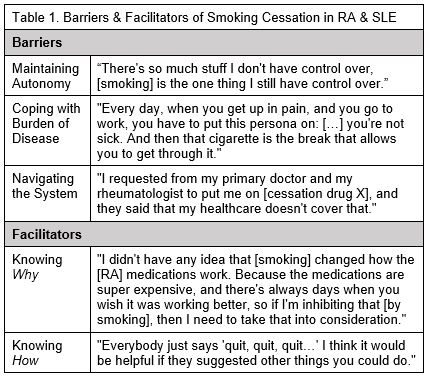Session Information
Session Type: ACR Poster Session C
Session Time: 9:00AM-11:00AM
Background/Purpose: Patients with RA and SLE are at higher risk for premature cardiovascular disease (CVD) than peers. Smoking is a leading modifiable risk factor for CVD and exacerbates rheumatic disease symptoms. Despite this, our prior work showed that only 10% of rheumatology visits with patients who smoke document cessation counseling. To address this gap, we previously implemented a new rheumatology staff protocol that increased referrals to the tobacco quit line 20-fold. The objective of the current study was to engage RA and SLE patients who smoke in focus groups to 1) examine barriers and facilitators of smoking cessation to further inform the protocol, and 2) identify meaningful outcomes that are signs of progress towards smoking cessation.
Methods: Using targeted letters, we recruited 19 patients (12 RA and 7 SLE) from two health systems to participate in one of three focus groups about smoking cessation support. 89% of participants were female, 47% white, 42% black, and 11% unknown race/Hispanic ethnicity. Ages ranged from 33-72. Two expert facilitators led each one-hour focus group using a semi-structured interview guide. Focus groups were recorded and transcribed verbatim. We used directed content analysis to classify barriers, facilitators, and valued outcomes regarding smoking cessation support. Two trained coders reviewed and coded all data using NVivo software.
Results: Participants discussed common barriers to quitting, including viewing smoking as “a crutch,” “a comfort,” and “the one thing I still have control over” while dealing with the burden of rheumatic disease, socioeconomic and other stressors, or trauma (Table 1). The new protocol was well received. Participants endorsed flexible terms like “cutting down” as opposed to strictly “quitting,” and preferred to receive counseling from staff who had personal experience with smoking or quitting. The outcomes that participants said they would value most fell primarily within two categories: knowing why to quit and knowing how to quit. Few were aware of the physiological impact smoking has on rheumatic disease, and none had heard that smoking can reduce the efficacy of rheumatic disease medication. Participants reported that knowing more about the effects of smoking on rheumatic disease and treatment would be a key motivator to quit smoking. Many requested that rheumatology staff help them identify tangible, day-to-day strategies to overcome cravings and connect them with resources they can use to quit smoking.
Conclusion: Focus group findings identified two key facilitators of smoking cessation for those with RA and SLE: understanding the specific health risks of smoking in rheumatic disease and knowing tangible steps to take towards quitting. Emphasizing the why and the how of smoking cessation is essential when designing and evaluating outcomes of rheumatology smoking cessation interventions.
To cite this abstract in AMA style:
Wattiaux A, Block L, Gilmore-Bykovskyi A, Ramly E, Sadusky J, Piper M, Bettendorf B, Rosenthal A, Bartels CM. Supporting Smoking Cessation in RA and SLE: Identifying Patient-Centered Outcomes [abstract]. Arthritis Rheumatol. 2017; 69 (suppl 10). https://acrabstracts.org/abstract/supporting-smoking-cessation-in-ra-and-sle-identifying-patient-centered-outcomes/. Accessed .« Back to 2017 ACR/ARHP Annual Meeting
ACR Meeting Abstracts - https://acrabstracts.org/abstract/supporting-smoking-cessation-in-ra-and-sle-identifying-patient-centered-outcomes/

